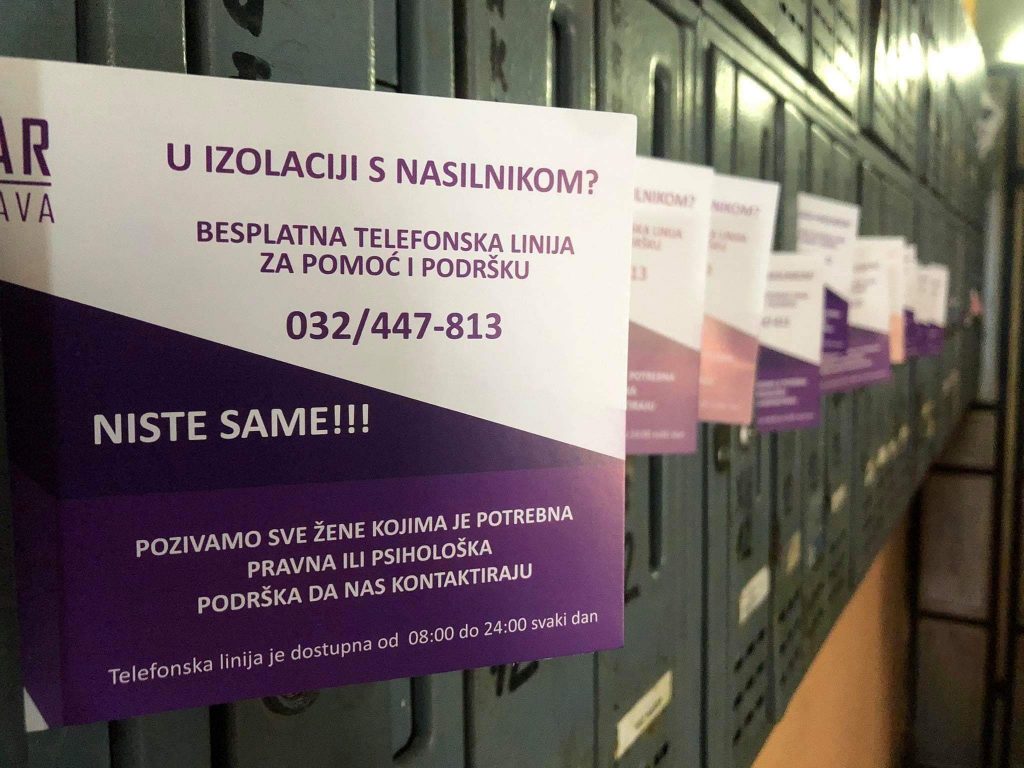BiH iz perspektive Nijemca: Robert Schlessmann
Odlazak iz BiH postaje sve popularnija svakodnevnica i sve veći broj Bosanaca odlučuje nastaviti svoj životni put u Njemačkoj. Da li je život u Njemačkoj idealan i podcjenjujemo li našu državu? U našem studiju, imali smo priliku razgovarati sa Robertom Schlessmannom iz Njemačke. Robert ima 18 godina, dolazi iz Hamburga i trenutno živi u Zenici, gdje će boraviti godinu dana.
(Leaving Bosnia and Herzegovina is getting popular every day and more Bosnians are deciding to countinue their life paths in Germany. Is life in Germany perfect and do we underestimate our country? In our studio, we had a chance to talk with Robert Schlessmann from Germany. Robert is 18 years old, he comes from Hamburg and currently lives in Zenica, where he will be staying for one year. )
Odakle ideja za dolazak u Bosnu i Hercegovinu? (Where did the idea of coming in Bosnia and Herzegovina came from?)
„Glavna ideja je bila da sam želio uzeti jednu godinu slobodnu. Većina učenika nakon završene škole nastave svoje školovanje odmah. Ja nisam želio da odmah nastavim sa školom. I razmišljao sam da provedem godinu u nekoj drugoj državi. Organizaciju koju sam odabrao ne dozvoljava da odlučite u koju zemlju želite ići. I pitali su me da li želim ići u Bosnu i naravno prihvatio sam. Bio sam jako uzbuđen, to su bile sjajne vijesti za mene.“
(„The general idea was that I just want to make a year free. Most students finish school and they start studying immediately. And for me, I didn't want to go to school right after I went to school. So I was thinking that I could do one year in some other country. The organization that I choose don't let you decide which country you want to go to. And they asked me if I wanted to come to Bosnia and I was like „yeah“. I was getting so excited, that was such good news for me.“)
Da li si prije znao nešto o BiH ? (Did you know something about Bosnia before?)
„Iskreno, znao sam samo ime i gdje se nalazi. Jer u njemačkim školama ne učimo o balkanskim državama. Sve što sam znao o toj temi je od drugih ljudi nakon vijesti da odlazim u Bosnu.“
(„Honestly, I only knew of the name and where it was located. Because in German schools we didn't get to teach anything about Balkan countries. Everything I knew more into the topic was from other people after the news that I would go to Bosnia.“)
Šta je nešto što si prvo uočio u BiH? (What was something you notice first in Bosnia?)
„Nešto što sam prvo uočio, što mi je bilo smiješno, je da je pušenje velika tema ovdje. Toliko je ljudi koji puše cigarete, a u Njemačkoj cigarete postaju sve manje popularne.“
(„First thing that I notice, it was kinda funny to me, that smoking is such a big topic here. There are so many people who smoke and in Germany that is getting really unpopular.“)
Koliko je teško biti osoba koja je promijenila mjesto boravka sa potpuno novom sredinom? ( How hard it is to be a person who changed the place of residence in a completely new environment?)
„Za mene je to poprilično opušteno, jer sam bio i prije u ovakvim situacijama. Bio sam na zamjeni učenika npr u Tanzaniju, Afriku. I navikao sam na taj proces. Uvijek je prisutan strah i misliš: „Kakvi će biti ljudi, da li će me prihvatiti?“ Ali taj strah nestao je za sedmicu.“
(„For me, it's pretty chill, because I've been in these situations before. I was in a school exchange, for example in Tanzania, Africa. And I'm kinda used to just the process. There's always fear related to that. You think: “What's the people gonna be like, are they going to accept me?“ But this fear was gone after a week.“)
Šta je nešto što voliš kod Bosanaca? („What is something you like about Bosnians?“)
„Nešto što stvarno volim kod Bosanaca je da prihvataju nove ljude. Svi su kao „Dođi, hajde sa nama na čaj!“ Mada ne baš čaj, čuo sam da je to nije popularno ovdje. Ljudi su jako otvoreni i prihvataju nove ljude, žele da ih upoznaju i da ih ugoste na najtopliji način. U Njemačkoj, kada odete na stanicu, svi ljudi samo prolaze i svi su jako hladni.“
(„Something I really like about Bosnians is that they are really accepting new people. They are all like: „Come in, let's grab a cup of tea!“ Well not really tea, I heard that it's not really popular here. They are really open and they just accept new people, they want to get to know you and want to pack you in a very warm area. But in Germany, when you go to the station, everybody is just passing and everybody is so cold.“)
Koje su to sličnosti i različitosti između Njemačke i BiH? (What are some similarities and differences between Germany and Bosnia?)
„Mislim da ima mnogo više sličnosti nego razlika. Posebno kada je riječ o ljudima i njihovom mentalitetu. Naročito mladi ljudi razmišljaju progresivno i žele možda promijeniti nešto. I mislim da mladi u Njemačkoj imaju isti mentalitet. Naravno gradovi izgledaju drugačije.“
(„I think there are a lot of similarities more than differences. Especially when it comes to people and their mentality. Mostly the young people think very progressively and they want to maybe change something. And I think youth in Germany have the same kind of mentality. Of course, cities look different.“)
Šta je nešto na šta se ne možeš naviknuti ovdje? („What is something you can't get used to here?“
„Nešto na šta se ne mogu naviknuti su planine ili genaralno priroda. Živim na 13. spratu i ponekad sjedim navečer i gledam izlazak sunca. I to je nešto što sam očekivao da će biti samo jednokratno uzbuđenje, ali uvijek kada sjedi tu misli:“O moj Bože, ovo se stvarno događa!“ „
(„Something I can't get used to are mountains or generally nature. I live on 13th floor and I sit sometimes in the evening and just watch the sunset. And it's something I expected to be a one-time excitement, but always when I sit there and I'm like: „Oh my God, this is really happening!“ „)

Zašto misliš da većina Bosanaca sanja o odlasku u Njemačku? (Why do you think most Bosnians are dreaming about living in Germany?)
„U Njemačkoj kada se diplomirate i studirate, imate jako dobru šanšu da radite na dobrom mjestu gdje dobijate puno novca. Mislim da to nešto što privlači Bosance, jer žele da imaju dobar život sa puno novca. Ali također morate puno platiti da biste živjeli. Npr. ako želite da živite u Hamburgu u stanu sa 50m2, plaćate oko 900 eura. Dok u Bosni, stalno govorim svojim prijateljima da kupujem pitu za 75 centi i svi se šokiraju.“
(„In Germany when you graduate and you study something you have a good chances of working in a good place where you get a lot of money. And I think that is something drawing Bosnians because they wanna have a good life with a lot of money. But you also have to pay a lot to live. For example when you want to live in Hamburg in apartment about 50m2, then you pay maybe 900 euros. But when it comes to Bosnia, I always tell my friends that I buy pita for 75 cents and they are all like: „What?“ „)
Šta smatraš da je negativno u BiH? (What do you think is negative in Bosnia?)
„Mislim da postoje neki dijelovi društva u Bosni koji ne rade ništa. Možda im je to dosadno i ne žele da idu naprijed, samo žele da žive svoj život ne mareći o tome šta se događa. Možete da radite nešto što će osvijetliti sliku o Bosni.“
(„I think there are some parts of society in Bosnia where they are not doing anything. Maybe they are a bit bored, they don't want to move forward, they just want to live their lives not caring about anything that's going on. You can do something to lighting up the image of Bosnia.“)

Da li postoje neke razlike u školskom sistemu između BiH i Njemačke? (Are there some differences in school system between Germany and Bosnia?)
„Definitivno postoje razlike. Nešto novo za mene je bilo ispitivanje, što ne postoji u Njemačkoj.“
(„There are differences definitely. Something new for me was „asking“, that's not the case in Germany“)
Da li imaš neku poruku? (Do you have any messange?)
„Možda je ponekad teško, uvijek je dobro da istražujete nešto novo, npr. novu državu. Imam 3 faze: komfornu zonu, zonu učenja i zonu panike. Ne želim da budem u svojoj komfornoj zoni.Posjećujte druge zemlje i učite o njima. A zona panike je kada postaje previše i kada možda se osjećate čežnju za domom, da se malo zaustavite. Mislim da je to moj životni moto.“
(„Maybe it's sometimes hard, it's always good to explore something, maybe a new country. I have 3 stages: comfort zone, learning zone and panic zone. I don't want to sit in my comfort zone. Visit other countries and learn about them. And panic zone is when it's getting too much and you maybe feel homesick, back up a little bit. I think that is my life motto.“)
Autor teksta: Sumeja Hazić


